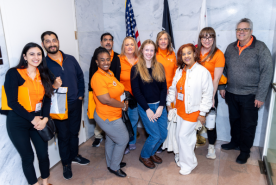August 11, 2025
Millions have CKD and don’t know it. See how NKF and the Coalition for Kidney Health are pushing for USPSTF screening recommendations.
Early stages of chronic kidney disease (CKD) often have no noticeable symptoms. This means diagnosis is usually delayed, and treatment options, especially those that could prevent irreversible kidney failure, are limited.
More than 37 million adults in the U.S. are estimated to have CKD, yet about 90% don’t know they have it. Without early detection, people lose valuable time to slow or stop the disease’s progression.
National Kidney Foundation (NKF) is committed to changing this. One of our key goals is to eliminate preventable kidney disease through early screening and diagnosis.
The Coalition for Kidney Health and CKD Screening
Several years ago, NKF formed the Coalition for Kidney Health, a diverse group of stakeholders focused on improving early detection and management of CKD. A top priority of the Coalition is to get a recommendation by the United States Protective Services Task Force (USPSTF) to identify and screen people who are at high risk of kidney disease.
Clinicians often rely on USPSTF recommendations to guide best practices in patient care.
What is USPSTF?
The U.S. Preventive Services Task Force is a group of volunteer medical experts who work to improve the health of people by making evidence-based recommendations about screenings and other preventive services.
The USPSTF operates under the Agency for Healthcare Research and Quality (AHRQ) and submits an annual report to Congress.
USPSTF at Risk
According to reports, U.S. Department of Health and Human Services Secretary Robert F. Kennedy, Jr. intends to remove all 16 members of the USPSTF. This could threaten the Task Force’s ability to provide independent, science-based screening recommendations, including those for CKD.
NKF joined more than 100 organizations in signing a letter from Friends of AHRQ to congressional health leaders, urging them to preserve USPSTF’s current structure.











